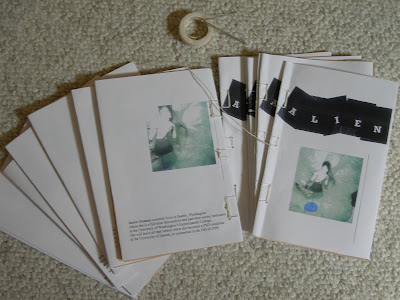
Do you ever have one of those teaching days where you're saying to yourself I'm totally nailing it! as you look up and all your students are nodding the way they do when an idea becomes the handle to a door and instead of just opening the damn thing, they've just unhinged the shit out of it and walked into the exciting realm of understanding? No?
Well, that happened for me today. But it took a while. And one student was one the verge of exploding with anger before that idea even became a door.
In the Contemporary Women Poets course I teach, we are reading Ariel: The Restored Edition, which includes the original order of Plath's manuscript, the facsimile of that manuscript, and a foreword by Plath's daughter, Frieda Hughes.
Frieda writes: "We already have a gravestone," I replied. "We don't need another." (xix). She is referring to the English Heritage's placing of the prestigious blue plaque, which is given to honor the life of the poet. But what happened was this: English Heritage wanted to place the plaque where Plath committed suicide, not in the home where she wrote and lived. "I wanted her life to be celebrated, the fact that she had existed, lived to the fullness of her ability, been happy and sad, tormented and ecstatic, and given birth to my brother and me" (xix). Any daughter would want that--the memory of a mother who was dynamic in both her weakness and power as a poet, a mother, a wife, a human.
Thinking about "being" human -- feeling the full range of that weight -- can be difficult for beginning poets. Hell, it's difficult for me, now. Teaching "Confessional" poetry is both exciting and frustrating. How do we get our students to not only be vulnerable on the page, but also craft that vulnerability into what "we" might consider poetry? There is a process for this, and with that process comes lots of questions about how we write a poem.
Here is an exercise that provoked a student to think about the ethics of writing:
Step 1: Write a list of three secrets. These secrets must be something you would never tell anyone, ever. (Some students struggled with this first step: "I don't know if I want to write those things." "Good," I say, "write what you can.")
Step 2: Now take each "secret" and re-write it in a way that you could relate that experience to someone close to you. Make that secret more manageable to tell.
One student became angry, saying something to the effect of "I'm not going to try and communicate something painful that I've been dealing with for years for a class." I was thrilled. That anger reminded me of a graduate workshop I took with Richard Kenny at the University of Washington during my first trimester in the MFA program. We were discussing what could/should be written. A lot of people struggled with the ethics of writing - words that have the power to damage our family, friends, our relationships, and ourselves. At that time, I had a different take: "But they are just words," I said. "I'm not afraid to write anything." I was simplifying, and lying.
So, I told my angry student, "That's okay, in fact, I completely understand. I'm happy you bring this up. Instead, write about why the process of communicating your secrets is difficult." The student smiled, nodded. Now the student understood where I was going.
Confessional poetry isn't admitting what's deep and dark. It isn't telling the page that you're sad or happy or floundering or whatever. It's what's underneath all those words. It's the process of concealment and exposure, and the war between those two acts.
After our writing exercise we examined Plath's poem "The Rabbit Catcher" and I urged the students to locate the "confessions" in this poem. Then we placed those confessions, literally located them in some image that we would later realize both reveals and conceals something about those confessions. This is when the doors came off. Like those "yellow candle-flowers" in spiny shrubs of "The Rabbit Catcher", something was burning. "They had an efficiency, a great beauty, / And were extravagant, like torture" (Plath 7). This poem is not an ars poetica, but isn't it? Doesn't the yellow flower dangle in front of us like a shiny carrot (poor rabbit)? Is that flower not what we are reaching for?
The process is both extravagant and torture; we find something extravagant in torture and something torturous in extravagance. My students will confess: writing is both wonderful and wondrous. It is also what comes before and after.
I thought I'd post the writing exercise I devised for this weekend's homework. I hope you find it helpful, inspiring, awful, difficult, and so on.
1. List 5 "confessions". For example "I have always been scared of my mother", would be a confession, or "I love to walk around my neighborhood at 3AM."
2. For each confession, write about where that confession is located, as in a place. For example ""I have always been scared of my mother / In the kitchen, she puts away the spoons" or ""I love to walk around my neighborhood at 3AM. / Each lamp post looks like a secret letter, spelling out a word when they are lit."
3. Pick ONE of those confessions its locale and write the first stanza to a poem. Contain at least one simile and one metaphor in the stanza. The stanza must be 6-8 lines. Post in the comments section of this post.
Ex:
I have always been scared of my mother.
In the kitchen, she puts away the spoons
like careful children tucked into tight sheets.
My mother shows her fossils at night.
Each crack glows like the fine linen
pressed into our faces.
She leaves before the morning,
dragging the spoons, leaving circles in the ground.
OR
I love to walk around my neighborhood at 3AM.
Each lamp post looks like a secret letter,
spelling out a word when they are tall, lit.
I cannot read in the early morning wind.
The word is inside a black mattress.
Don't lift it, spill every feather, every penny.
Instead, keep walking like the thinness of paper,
dragging the notes, never pausing to listen.






